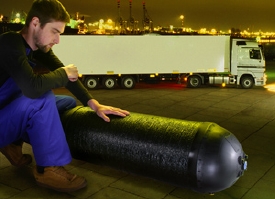Nov 20 2008
Schmitz Cargobull showcased the first compressed-air tank made of plastic for truck trailers at the International Motor Show (IAA) for Commercial Vehicles in Hannover, Germany in September of 2008. This part was developed by the Comat company of Kaiserslautern, Germany using three precisely harmonized Ultramid® types (PA: polyamide) from BASF’s product range. The reservoir measures 1.2 meters in length, has a diameter of 32 cm and holds 80 liters. In trucks, it serves for the compressed-air control for numerous mechanical functions, especially for the brake and air-suspension systems. Up to now, this compressed-air tank has been made of metal.
 First compressed-air reservoir for truck semi-trailers made of plastic: Three Ultramid® grades have been used
First compressed-air reservoir for truck semi-trailers made of plastic: Three Ultramid® grades have been used
The novel multi-step process for the manufacture of these reservoirs starts with a high-viscosity Ultramid extrusion type from BASF’s polyamide-6 range, from which Comat extrudes pipes that are then cut to size. Subsequently, a process developed by Comat is employed to impregnate continuous glass fibers with a heat-stabilized Ultramid type: These fibers are then wound around the pipe. Finally, an injection-molded cap made of a third BASF polyamide is affixed to the ends of the pipe. For this purpose, the company employed a special welding technique so that the cap is joined to the pipe ends to be pressure-tight. The advantages of this plastic compressed-air reservoir in com¬parison to metal tanks are not only its reduced weight and cost but above all, its corrosion resistance.
“The weight reduction by 10 kg, in conjunction with costs that are comparable to those of previous tanks, was the main argument for us to invest in this develop¬ment,” explains Ralph Funck, CEO of Comat. “The new compressed-air tanks made of plastic meet the high requirements that we had also stipulated for the earlier metal versions,” comments gradual industrial engineer Mark Hengst, of the brakes/lights/telematics strategic purchasing department of Schmitz Cargobull AG. “This is a huge step in the direction of using more plastic in trucks.”
Comat Composite Materials GmbH is a young, innovative company. It was founded in the year 2000 and, together with four other young firms, is part of the Rhineland-Palatinate Plastic Net¬work in Kaiserslautern. Comat employs its fiber-impregnation technology to develop new manufacturing methods for the production of high-performance plastic components.